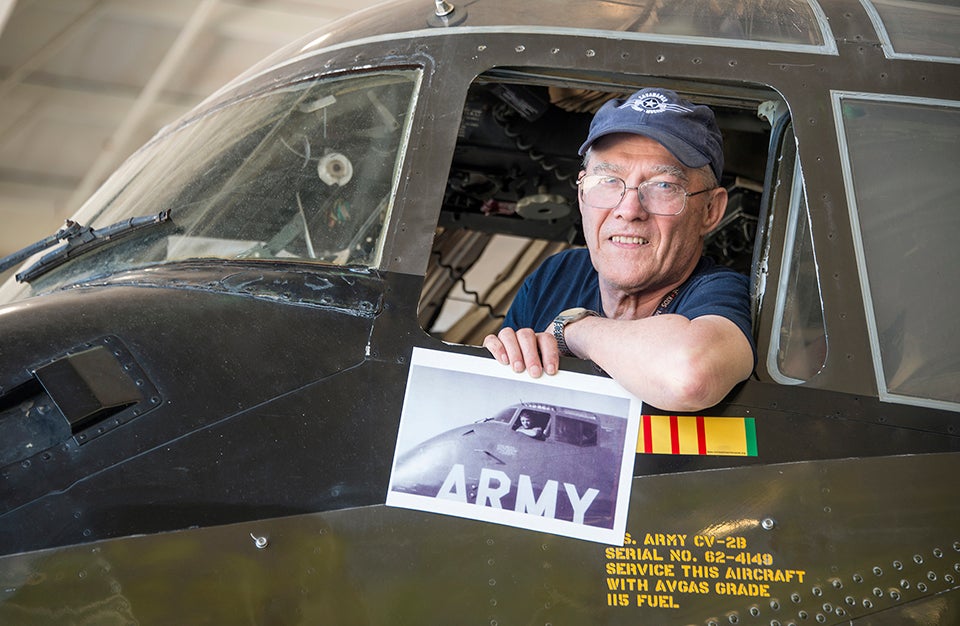We're hiring! Check out our opportunities on our careers page!
Our Office: 4100 32nd Ave. S. Fargo, ND 58104
Our Office: 4100 32nd Ave. S. Fargo, ND 58104

Bob Schrader proudly donned a Vietnam Vet cap as he flipped through photo albums of his time serving in the U.S. Army. The 80-year-old was just 19 when he and his twin brother enlisted, fresh out of high school in rural South Dakota.
“You can see I was a grease monkey,” Schrader laughed, pointing to a portrait of his younger self in his aircraft maintenance uniform, standing alongside the tail end of a U.S. Army twin-engine Caribou transport plane. “They needed 14 people trained on multi-engine for the brand-new Caribou, so the top 14 people got the position. I was number 14. I just made it.”
Schrader served as assistant crew chief and then crew chief of the Caribou 62-4149 for a year during the Vietnam War. Although it wasn’t his job to fly the plane – he oversaw aircraft maintenance and mission support – he remembers the steep ascent and descent of the war’s short 1,000-foot runways, for which pilots had to learn special techniques. “How to get over the bullets and get her down and land without smashing up the airplane,” Schrader said. “In Vietnam, we all had to know how to land it in case they [the pilot] got shot.”
Schrader and the Caribou 62-4149 crew left North Carolina’s Fort Bragg and headed east, first landing in Saigon on July 4, 1963. Their primary focus was transport, flying Vietnamese soldiers throughout the valleys, and hauling food and ammunition where it was needed. The Vietnamese used “live weight” food, so the Caribou would often be loaded with live pigs, ducks, geese, and chickens in addition to rice.
“So, you always flew with the doors open to keep the…” he said, pausing with a grin. “I left the farm to get rid of the chickens.”
In March 1964, Schrader’s Caribou 149 was sent out for major maintenance, and he was given Caribou 593 in the interim. Two months later, a fellow crew chief, Don, asked Schrader to switch his short flight with Don’s long flight so that he could see a doctor about a back problem. It was too late to reschedule their missions, so they simply switched planes—Don would be flying with Schrader’s plane and crew on May 5.
“At 10:30 in the morning, I sat in Don’s airplane listening to mine take off,” Schrader said. Soon after takeoff, he heard a mayday call from 593. “It caught on fire, inverted, and landed nose first.”
Ten Americans (including Schrader’s crew) and five Vietnamese soldiers were killed in the crash, which at the time was the worst American military air disaster in Vietnam.
“I was sitting in Don’s airplane going, boy, I’m lucky,” Schrader said. “And my next thought was, why is God saving me? Don had a wife and three kids, and I was just a farm kid.”
Schrader experienced war horrors during his time in Vietnam, but he admits the troops who followed him saw far worse. The war was starting to ramp up just as it was time for Schrader to come back home. Through more than 125 sorties, he received five Air Medals, the Armed Forces Expeditionary Medal, and a Vietnam Service Medal with one Bronze Service Star.
In 1965, Schrader left the Army and received a degree from the Brown Institute of Electronics in Minneapolis. He soon settled into life as a lineman with Northwestern Bell Telephone Company in Fargo, where he later worked closely with Cass County Electric Cooperative, spreading the word of the new Call Before You Dig program. Living in Kindred, North Dakota, and now Fargo, he’s been a CCEC co-op member for more than 50 years.
In 1999, Schrader was cruising the web when he decided to run a search on his old plane.
“And this one popped up: 149. I said, ‘That’s mine!’” he recalled. He thought the plane had crashed during the war, but here it was, safe in the hands of the Army Aviation Heritage Foundation in Georgia. The next summer, he met up with Caribou 149 once again at the Oshkosh Air Show, remembering some bullet holes and spotting many new ones as he walked through the aircraft. It was the only flyable Caribou left in the country, and Schrader knew he wanted to help tell its story.

